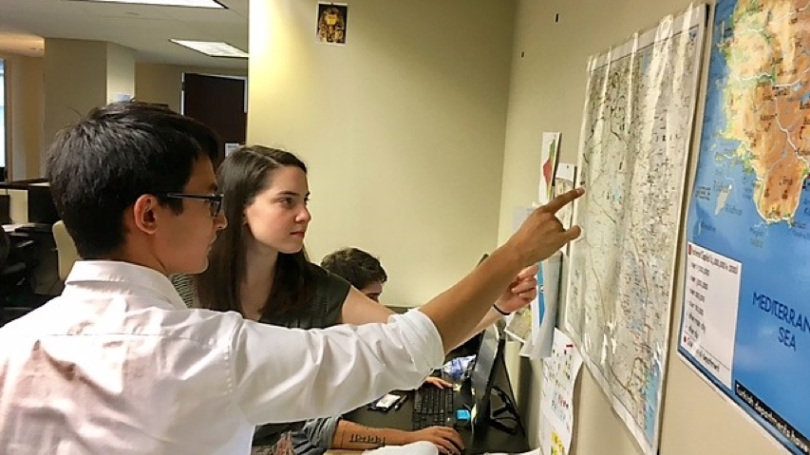
- Public Policy
- Leadership
- Funding
- News & Events
- About the Center
Back to Top Nav
Back to Top Nav
Back to Top Nav
Back to Top Nav
Charlotte Kamin '18 interned with the Institute for the Study of War (ISW) for the Summer 2017 term. The following is an excerpt from her internship report.
This summer, I served as an Iraq research analyst intern with the Institute for the Study of War (ISW). ISW is a non-partisan think tank in Washington D.C. that researches and analyzes the political and security conditions abroad to better inform the American public and to influence U.S. strategy and policy in critical regions. ISW conducts rigorous open-source research in order to provide accurate and timely intelligence on developing military operations, enemy threats, and socio-political realities in key regions like the Middle East and Central Asia.
As an intern on the Iraq Team, I was responsible for briefing the relevant ISW staff on daily kinetic and political developments throughout Iraq. Each day, I collaborated with the Iraq Team to produce a Commander’s Critical Information Requirement (CCIR), drawing upon open-source Arabic and English language research to provide a common operating picture of the most significant daily developments in Iraq, as well as offer analytical assessments about these critical updates. Using ISW’s innovative software and expansive knowledge database, I conducted larger projects on the Iraqi Army’s capabilities, Shi’a militia mobilizations, and the Kurdish referendum, for example, to support the research of ISW staff. Throughout my internship experience, I had the opportunity and responsibility to familiarize myself with the complex, socio-political details of Iraq and the Middle East at large.
ISW also provided me exciting opportunities that allowed me to contribute to critical company products. For instance, ISW is renowned for its detailed and accurate maps on conflict zones, which are often published on major media outlets. A top ISW leader once asked me and another Iraq intern to determine ISIS control of terrain in a key city in Iraq. She expected us to give her the product in a few short hours and made clear that she expected well-researched and detailed information. While this task was initially daunting, it truly brought out the creativity in me and my Iraq teammate, and it enabled us to collaborate effectively and efficiently. We carefully looked at detailed maps of this Iraqi city, highlighting even the smallest villages on the outskirts of the city and noting key features in the terrain. We then conducted rigorous research on any findable information in ISIS’ movements in these villages, and tracked the operations of the Iraqi Army simultaneously to determine the most accurate possible picture of ISIS control of terrain. Our boss was very pleased with our work and later published a revised map that reflected our findings. This experience gave me an opportunity to work quickly on a relatively high stakes task, while not sacrificing the quality of the research along the way. I had to learn to trust myself and dive head first into this project, even though it was out of my comfort zone and had a high chance of failure. I will always look back at that few-hour task as one of my most rewarding and exciting experiences at ISW.
As a rising senior specializing in Arabic and Middle Eastern Studies here at Dartmouth, this internship was both a phenomenal academic and professional experience, as it strengthened my language skills and immensely contributed to my deeper understanding of regional politics and conflicts. ISW provided me an indispensable education on war and conflict, regional sectarian and ethnic dynamics, and exposed me to career options in the national security and policymaking communities that I hope to continue to explore after Dartmouth. I also hope to further explore the unique type of research I conducted at ISW, which always felt extremely relevant and was geared towards creating timely and actionable policy. I would like to thank Dartmouth’s Rockefeller Center for guiding me in the internship process and helping me realize my academic and professional goals. I would also like to extend my deepest gratitude to the Class of 1954 for their generosity and kindness in affording me such a wonderful and inspiring opportunity to work with ISW.